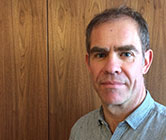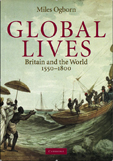Profile
Twitter: @MilesOgborn
Bluesky: @milesogborn.bsky.social
I am an historical geographer concerned with understanding the relationships between power, space and knowledge in a range of mainly eighteenth-century contexts. My work has dealt with the new geographies of eighteenth-century London, and trying to understand them as Spaces of Modernity (1998). It has also investigated the ways in which the English East India Company used a variety of forms of writing (Indian Ink, 2007) to construct a global trading network and territorial empire in India from 1600 to 1800. This was the same broad timespan for my attempt to write an introduction to global history through biography in Global Lives (2008). My most recent book (The Freedom of Speech: Talk and Slavery in the Anglo-Caribbean World, 2019) investigated how different forms of talk – such as evidence giving in court, discussions of the plants that grew on the islands, and communications with the world of gods and spirits – demonstrate the complexities of the power relations of slavery and empire. I am now working on the historical geographies of slavery and freedom in Jamaica. For example, my discussion of ‘Slavery, Freedom and the Jamaican Landscape’ on the British Library’s Picturing Places webspace and a paper on the last and largest uprising in the British Caribbean colonies, “Fire in Jamaica, 1831-32” in Journal of British Studies.
Key publications
- Ogborn (2024) ‘Fire in Jamaica, 1831-32,’ Journal of British Studies, pp. 1-20 DOI: https://doi.org/10.1017/jbr.2024.88
- Ogborn (2023) ‘Cedric Robinson’s Black Marxism and the uses of historical geography,’ Journal of Historical Geography 82 pp. 81-90 https://doi.org/10.1016/j.jhg.2023.09.009
- Ogborn (2020) ‘Speech,’ in M. Domosh, M.J. Heffernan and C.W.J. Withers (Eds) The Sage Handbook of Historical Geography (Sage, London) pp779-96.
- M. Ogborn (2020) ‘Uttering geographies: speech acts, felicity conditions and modes of existence,’ Progress in Human Geography44:6 pp.1124-1140 https://doi.org/10.1177/0309132519884634
- M. Ogborn (2019) The Freedom of Speech: Talk and Slavery in the Anglo-Caribbean World (Chicago University Press, Chicago) x + pp. 309.
- M. Ogborn (2014) ‘Discriminating evidence: closeness and distance in natural and civil histories of the Caribbean,’ Modern Intellectual History 11:3 pp. 629-51.
- M. Ogborn (2013) ‘Talking plants: botany and speech in eighteenth-century Jamaica,’ History of Science, 51 pp. 1-32.
- M. Ogborn (2011) ‘The power of speech: orality, oaths and evidence in the British Atlantic world, 1650-1800,’ Transactions of the Institute of British Geographers 36:1 pp. 109-125.
- M. Ogborn (2011) ‘A war of words: speech, script and print in the Maroon War of 1795-6,’ Journal of Historical Geography, 37:2, pp. 203-215.
- M. Ogborn (2008) Global Lives: Britain and the World, 1550-1800 (Cambridge University Press, Cambridge) xx + pp. 343
- M. Ogborn (2007) Indian Ink: Script and Print in the Making of the English East India Company (Chicago University Press, Chicago) xxiv + pp. 318.
- M. Ogborn (1998) Spaces of Modernity: London’s Geographies 1680-1780 (Guilford Press, New York) xii + pp. 340.
Achievements/Awards
- 2023 Elected a Joint Fellow of the British Academy (Early Modern History)
- 2015-2017 Leverhulme Trust Major Research Fellowship
- 2012 Elected a Fellow of the British Academy (Geography and Anthropology)
- 2009 Distinguished Historical Geographer. Awarded by the Historical Geography Specialty Group of the Association of American Geographers.
- 2001 Philip Leverhulme Prize from the Leverhulme Trust
Teaching
I teach modules in human geography at both undergraduate and postgraduate level. In all of my teaching I aim to introduce students to key concepts through using a wide range of examples (often from my own research), and getting students to analyse and understand original materials for themselves. I have also written the textbooks for my own courses, so that students have clear guidance on what I am looking for and a range of resources to bring to the classroom.
I teach parts of human geography that are often new to students arriving at university, so it is important to make them accessible. In the third year I teach a module (GEG6105 Global Historical Geographies) based on my book Global Lives – and also on visits to London museums. Here students are taught how to use historical sources, and how to write their own historical accounts of subjects such as slavery, piracy and oceanic voyaging. I am part of the team that runs the fieldcourse to Boston, USA for second and third years – GEG5125/GEG6125 Boston Reworked – which involves students learning on the ground how we can understand the city’s past and present through a combination of historical documents, surviving objects and examining the landscape of the city itself. I am also part of the team that teaches GEG5142 Colonial Lives and Afterlives, part of an attempt to decolonize our historical and geographical thinking by investing the ways the colonial past shapes the geographies of the present.
Research
Research Interests:
Historical Geographies of Empire
Historical Geographies of Slavery
Historical Geographies of Communication
Previous Research Project
Reconnecting Sloane: Texts, Images, Objects
AHRC Extended Collaborative Doctoral Award programme (2012–2015)
Sir Hans Sloane (1660–1753), doctor, traveller, natural philosopher and man of letters, was responsible for gathering together one of the greatest collections of the seventeenth and eighteenth centuries, which went on to form the basis of the British Museum. This project of three interlinked PhD studentships investigates his collection of thousands of manuscripts and printed books, multiple albums full of pictures and numerous objects (including a vast range of botanical and zoological specimens) to understand how it was part of the great transformation of knowledge about the world and about nature in the early Enlightenment. In collaboration with the Natural History Museum, my part in the project is to supervise Victoria Pickering’s research on Sloane’s “Vegetable Substances”, a collection of over 8000 catalogued specimens in individual hand-made boxes. You can hear something about this in this short talk I gave at the Natural History Museum. Hans Sloane's Vegetable Substances, Miles Ogborn's contribution to the AHRC Sloane Treasures Workshop, Natural History Museum, London, April 2012.
Supervision
Completed:
- Darrin Bayliss (ESRC studentship, QMUL) The Emergence of “Community” on Inter-War Council Housing Estates in London (completed 1998)
- Kim Pang (ESRC studentship, QMUL) Towards British-Chinese Futures: A Social Geography of Second Generation Young Chinese People in London (completed 1999)
- Alastair Owens (QMUL studentship) Small Fortunes: Property, Inheritance and the Middling Sort in Stockport, 1800-1857 (completed 2000)
- Janet Hill (Self-funded, part-time, QMUL) Local Government Change and the Production and Consumption of Leisure Space in the Surrey Docks Peninsula 1979-1997 (completed 2000)
- Glenn Smith (Health Authority funded, QMUL) Windows in Time: The Spatial Experience of Men with Chronic Illness/Disability From Childhood to Adulthood (completed 2001)
- Robert Higham (QMUL studentship) Social Justice and Higher Education in South Africa (completed 2003)
- Dr Lydia Bruce-Burgess (ESRC/NERC studentship, QMUL) Evaluating River Restoration Appraisal Procedures: The Case of the UK (completed 2004)
- Dr Fiona McConnell (ESRC 1+3 studentship, QMUL) Sovereignty Without Territory? The Political Geographies of the Tibetan Government-in-Exile (completed 2009)
- Elin Jones (AHRC CDA studentship with National Maritime Museum, Masculinity and Material Culture in the Royal Navy, 1750–1815 (completed 2016)
- Anna Kretschmer (QMUL studentship) Theatre and the Body in Eighteenth-Century London (completed MPhil 2017)
- Gabriel Wick (self funding, part-time, QMUL, 2010– ) Dissident Landscapes: Garden Design, Oppositional Politics and Aristocratic Identity in France, 1770-1781 (completed 2017)
- Victoria Pickering (AHRC CDA studenship with Natural History Museum) Putting Nature in a Box: Hans Sloane’s Vegetable Substances Collection (completed 2017).
- Hannah Stockton (AHRC CDA studentship with the National Maritime Museum). ‘Flows for All Mankind’: Everyday Life, the City and Empire on the London Thames, 1660-1830 (completed 2018).
- Dr Tim Riding (QMUL Principal’s studentship, 2014-2018) Producing Space in the English East India Company’s Western Presidency, 1612-1780 (completed 2018)
Current:
- Kim Glassman (Self-funded, with School of English and Drama) “Gender, Botany, and Empire: Flora Boreali-Americana (1829-1840) and the Botanical Work of Harriet Sheppard” (2021- )
- Jamie Gemmell (LAHP funded, with School of History, KCL) “Reckoning with Race in Early Modern London” (2023- )
- Fleur Fitzpatrick (LISS funded) “Rooted Journeys: Maroon Ecologies and Cultural Keystone Species in Transatlantic Contexts” (2024- )
I welcome applicants for PhD research on any aspect of the historical geography of the long eighteenth century, particularly in relation to questions of knowledge and questions of global trade, maritime history and empire. I also welcome applicants interested in questions of space, power, knowledge and communication in other periods and places, or those who are interested in collaborative research projects with museums.
Public Engagement
My research (and some teaching) has involved working with museums. As well as being a past and present member of advisory committees for the National Maritime Museum and the London Museum, I have been the supervisor of AHRC Collaborative Doctoral Awards with the National Maritime Museum (on masculinity and material culture in the eighteenth-century Royal Navy, and on representations of the Thames as the river of empire in the eighteenth century), the Natural History Museum (Reconnecting Sloane) and the Museum of Childhood (The Child in the World). Each of these projects has helped change the ways that these museums and their many visitors experience and engage with their collections. As a small example, I am proud to say that the interactive pleasure gardens exhibit in the Capital City galleries of the Museum of London was inspired by my work in Spaces of Modernity (1998) to bring together multimedia versions of past and present artefacts to reimagine the sensory experience of the garden.
More recently, I have begun public engagement work in relation to slavery and its legacies. This has involved a report for the Portal Trust (formerly the Sir John Cass Foundation) on the connections between its founder, the Royal African Company and the transatlantic slave trade, and a series of articles for The Gleaner, Jamaica’s main daily newspaper on the 1831-32 uprising on the island:
‘Reparations Conversation: The burning of Moor Park Estate,’ The Gleaner, Sunday 8th January 2023.
‘Reparations Conversation: Fight against chattel enslavement,’ The Gleaner, Sunday 22nd January 2023
‘Reparations Conversations: Jinny’s Spark and the Burning of Kirkpatrick Hall Estate, December 1831,’ The Gleaner, Sunday 5th February 2023

